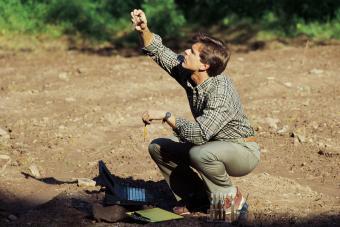
Formally, geology is the study of the earth and its processes. In practice, geology covers many disciplines from plate tectonics (the study of the forces that give rise to earthquakes and continental drift) to carbon dating, used to calculate the age of fossils. Simply put, geology is the study of the origin, structure and history of the earth.
Types of Geologists and What They Do
The field of geology is broad and encompasses a variety of smaller fields of study, or disciplines, some of which include:
- Mineralogist - Mineralogists study minerals and how to classify them. They will look at the chemical makeup of a mineral, as well as its geographical distribution, physical structure and formation.
- Paleontologist - Paleontologists study fossils. Most paleontologists spend time in the field collecting fossils for study, and work for museums or universities.
- Stratigraphers - Stratigraphers study layers of rocks so they can better understand the earth's history.
- Sedimentologists - Sedimentologists look at sediment, (sand, mud or clay) to understand how it is deposited and how it was formed.
- Geophysicists - A geophysicist uses gravity, electrical, magnetic and seismic methods to study the Earth.
- Geochemists - Geochemists look at how chemical elements are distributed in rocks and minerals, and how those elements move into soil and water systems.
- Volcanologists - Volcanologists answer questions about when and where volcanoes are likely to erupt, as well as look at dormant volcanic deposits to help answer questions about geological history.
- Engineering geologists - Engineering geologists use principles of geoscience to help solve engineering problems.
- Oceanographers - Oceanographers study a variety of things including plate tectonics and the geology of the ocean floor.
Why Geology Is Important

Geology is much more than merely the study of rocks. As a scientific discipline, geology has produced some of the most important insights in the history of science. Geologists have provided accurate information regarding climate change, energy exploration, and even the evolutionary history of life on earth. The Geological Society notes that geology is an important field of science because it address many practical issues that directly impact life, such as:
- Finding reliable sources of energy
- Locating a dependable supply of clean water
- Locating and extracting minerals from the earth
- Understanding how people and structures interact with their geologic environment
- Understanding geohazards such as volcanoes, earthquakes, tsunamis, hurricanes, etc.
- Predicting and understanding climate change
- Looking at how human activity has impacted the landscape and substructure of the earth
Why Geology Matters

Daily life depends on the work of geologists and their discoveries. The electricity that powers homes, the gasoline in vehicles and the water that people drink - all of these things are available to people safely and inexpensively because of the work of geologists.
As the world changes, population increases and natural resources dwindle, geology will be needed more than ever. The world of the 21st century demands sources of energy that are abundant, clean, safe and inexpensive. As cities grow and people move into previously unpopulated areas, geologists can help figure out the best way to build and thrive while sparing the planet and her environment. Geology is the science that will provide the path to the future that is cleaner, safer, more prosperous and happier.







